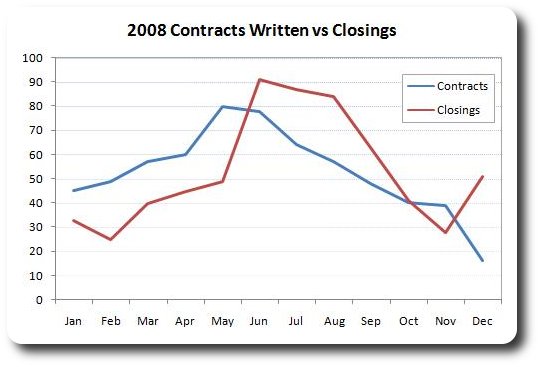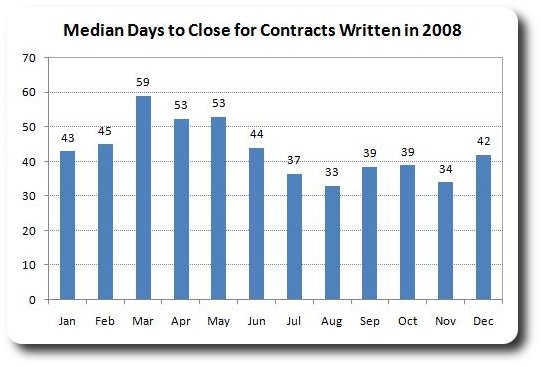
Real estate activity in West Hartford feels like it has really picked up over the past few weeks. Agents are buzzing around like busy bees, and houses are going under contract. We’re seeing some homes sell very quickly after they are offered for sale, and we’re seeing multiple buyers compete for properties. There is clearly still broad interest in living in West Hartford.
I was curious to see if the data supported our “feel” for the market, so I decided to try to look at the number of homes that went under contract in the town of West Hartford since the beginning of the year. My initial plan was to plot the number of contracts written on a week-by-week basis and then compare that to last year. Unfortunately, I was foiled by the MLS data source. We are only allowed to see the date on which a property went under contract after the listing agent moves it to “Deposit” status.
Properties flow through five standard categories in the MLS during the sales process. They go from “New” to “Active” to “Show” to “Deposit” to “Closed.” The “New” status helps flag new inventory for agents and lasts for a maximum of 7 days before a property is automatically moved to “Active.” Homes that are considered “for sale” are in either “New” or “Active” status. Once an offer has been accepted, the listing agent sets the status to “Show,” which means that buyer’s agents can still show the home to other potential buyers just in case the current deal falls apart. Since most deals stay together, we don’t typically show properties in “Show” status. There are no formal rules about when a property moves to “Deposit” status, but most agents wait until the mortgage commitment contingency has been satisfied.
Which brings me back to my data problem. Most of the recent contracts have not achieved “Deposit” status, so I’m not allowed to see the date on which it went under contract. All I can see is that of the 176 contracts that have been accepted so far in West Hartford in 2009, that 52 have closed already, 53 have reached Deposit status, and the remaining 71 are in Show status. Circumstantial evidence that there has been a flurry of deals, but nothing concrete.
The research got me thinking about the number of contracts written each month versus the number of closings during that month. Agents do a lot of work in the spring, but the results don’t show up until later when the closings actually happen. And West Hartford in particular seems like a town where people like to close during school summer vacation. Below is the number of contracts written versus the number of closings for each month in 2008.

From January through May, the number of contracts exceeded the number of closings by a considerable margin. In June, the number of closings nearly doubles, setting the stage for more closings than contracts through September. Contracts written has a final hurrah in November, followed by a spike in December closings.
The real estate market is busiest when buyers and sellers are agreeing to contracts. That’s when the action is for the agents too - we have to be able to keep up with all of our buyers and sellers. Once the contract is in place, the focus shifts to the inspection, mortgage and legal team members as buyers work through their purchase contingencies on their way to closing.
The time between a buyer and seller signing a purchase contract and the actual closing can vary considerably. What’s hidden in the chart above is that contracts written earlier in the spring tend to close more slowly than average. And contracts written over the summer tend to close more quickly than average.

Although every situation is different, contracts written during March, April and May take noticeably longer to close than those written in July and August. There’s not really any way to prove motive, but the trend seems to support the hypothesis that closings are intentionally scheduled within the summer school vacation if possible. Deals negotiated in the spring extend the closing, while deals negotiated during the summer accelerate it. Deals negotiated when the summer school vacation is not in play cluster around 40 days to close.
So there we have it - a meander through real estate purchase contracts, MLS statuses and days to close. The data seems to support my mental models about both when the real estate market is most active and that West Hartford buyers and sellers tend to work around the summer school vacation. Hopefully I’ll remember to look into my initial question once the 2009 data is available…

